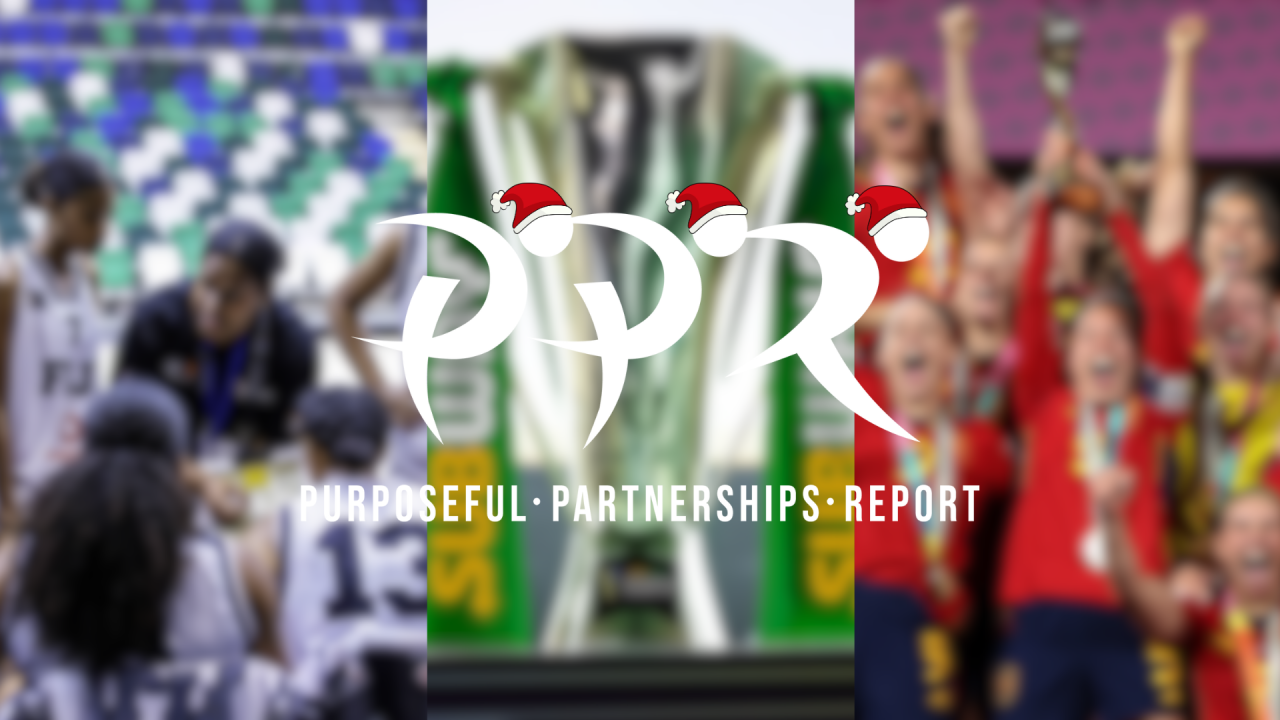Highlights from the Paris Olympics, Athletics Kenya, and ICC

Welcome to the fifth edition of the Purposeful Partnerships Report, the weekly newsletter highlighting purpose-driven partnerships in the sports industry. This week, we focus on international sports as we explore the Paris 2024 Olympics Sustainability Plan, the unique collaboration between Athletics Kenya and the Swedish Athletics Association, and the extension of the partnership between the International Cricket Council and UNICEF. Let’s dive in!
The Paris 2024 Olympics: Aiming for the Most Sustainable Games Yet

The Paris 2024 Olympics are set to be a landmark event in terms of environmental sustainability, with organizers committing to ambitious goals that could set new standards for future global events. Here’s a detailed look at the sustainability initiatives planned for the Paris Games and the challenges they face.
Ambitious Goals and Strategies
Reducing Carbon Footprint
Organizers are aiming to slash the carbon footprint of the Games by 50% compared to the London 2012 and Rio 2016 Olympics. This reduction translates to limiting emissions to 1.58 million metric tons of CO2 equivalent, a significant decrease but still a considerable amount.
Venue Utilization
A major component of the strategy is minimizing new construction. Approximately 95% of the facilities used will either be existing or temporary. Only two new structures are being built: the Olympic Village, which will later be converted into housing and office space, and an aquatics center in Paris’ northern suburbs. These efforts are expected to reduce emissions from construction by 30%, thanks to the use of low-carbon materials like wood and salvaged materials.
Sustainable Food and Energy
Food production and transport are significant sources of emissions, and the organizers plan to mitigate this by sourcing 80% of ingredients locally and offering 60% plant-based meals. This approach aims to halve the average CO2 emissions per meal from the current 2 kilograms in France. Additionally, the Games will use 100% renewable energy, sourced from wind and solar farms, with all venues connected to the power grid to avoid the use of diesel generators.
Addressing Transportation Challenges
One of the most significant challenges is managing transportation-related emissions, especially given the expected 15.3 million visitors, including 1.9 million from outside France. Paris will promote low-carbon transport options within the city, such as cycling routes, Metro trains, buses, and other public transit. However, long-haul flights remain a major source of emissions.
The Tahiti Trade-off
The decision to hold the surfing events in Tahiti is one of the more controversial aspects of the sustainability plan. Although this location reduces the need for new infrastructure, it also requires significant travel, which contributes to carbon emissions. Organizers argue that fewer spectators traveling to Tahiti, instead of more accessible metropolitan areas, ultimately results in lower emissions.
Sponsorship Concerns
One of the more contentious aspects of the Paris 2024 sustainability plan is its sponsorship. Key sponsors include Air France, CMA CGM Group (a major ports operator), and ArcelorMittal, a leading steel and mining company. These companies are known for their high carbon footprints, which seems at odds with the overall sustainability goals of the Games.
Air France, for example, is a significant contributor to aviation emissions, while ArcelorMittal is involved in steel production, a highly carbon-intensive industry. Despite their publicized efforts towards sustainability, such as Air France’s investment in sustainable aviation fuel and ArcelorMittal’s push for low-carbon steel production, their involvement has drawn criticism.
Conclusion
The Paris 2024 Olympics have made significant strides in establishing new standards for sustainability in mega-events, but the challenges remain clear. The ambitious goals and strategies of the Paris Olympics underscore a broader issue facing all large-scale events: balancing the desire to unite people in celebration and competition with the urgent need to protect our planet. The organizers' commitment to reducing carbon emissions, utilizing existing infrastructure, and promoting sustainable food and energy practices are commendable steps in the right direction. However, contradictions, such as holding events in distant locations like Tahiti and partnering with carbon-intensive sponsors, highlight the complexities of achieving true sustainability in event planning.
Despite not reaching perfect sustainability, the Paris Games represent a significant effort to mitigate the environmental impact of such a massive event. They serve as a case study in this balancing act, offering valuable lessons for future hosts like Los Angeles in 2028 and aiding in creating more sustainable Mega Events.
For more details, visit the Paris 2024 Sustainability Report, KSL News, Yahoo Sports
Additionally, if you are interested in taking a deeper dive into the future of Mega Events I highly recommend reading Circus Maximus: The Economic Gamble Behind Hosting the Olympics and the World Cup
Athletics Kenya and Swedish Athletics Association Strengthen Collaboration for Sustainability and Climate Action

Athletics Kenya and the Swedish Athletics Association have announced a significant initiative to deepen their collaboration on sustainability and climate action in athletics, focusing on the 2024 Adidas Stockholm Marathon.
Building on Previous Success
This initiative builds on their successful partnership established during the United Nations Stockholm+50 Conference in 2022 and reinforces their commitment as signatories of the UNFCCC Sports for Climate Action Framework. Together, they aim to promote sustainability within the global athletics community.
Air Quality Monitoring at the Stockholm Marathon
In an exciting development, three new air quality sensors have been installed along the Adidas Stockholm Marathon route with technical support from the Stockholm Environment Institute (SEI), and the United Nations Environment Programme (UNEP), to monitor air quality during the 2024 marathon. This marks the second World Athletics-sanctioned marathon to feature real-time air quality monitoring, following the Nairobi City Marathon in 2022 and 2023.
Expanding Air Quality Monitoring in Africa
Building on this collaboration, Athletics Kenya, UNEP, and the SEI Africa Centre have successfully deployed air quality sensors in 14 sports stadiums and facilities across six African countries over the past three years. This initiative provides real-time air pollution data to sports administrators and city authorities, enhancing the health and safety of athletes and spectators alike.
Inspiring Global Action
I love the partnership between Athletics Kenya and the Swedish Athletic Association, as it underscores the importance of collaboration and creativity in making sports more sustainable for everyone. This approach enhances safety by implementing eco-friendly measures at marathons and improving infrastructure at stadiums to ensure a safer and more enjoyable experience for both athletes and fans. This partnership represents a significant step forward in integrating sustainability and climate action into the world of sport and has the potential to inspire similar sustainability efforts by other athletic federations worldwide.
International Cricket Council and UNICEF Extend Partnership Focused on Empowerment

The International Cricket Council (ICC), the global governing body of cricket, and UNICEF have announced the extension of their partnership until 2027, aiming to empower girls and women through cricket.
Achievements and Impact
Over the last eight years, ICC and UNICEF have successfully utilized cricket’s popularity to help accelerate gender equality. This renewed collaboration provides a critical platform to reach millions of children, adolescents, and their families, impacting their lives and communities positively through cricket.
CRIIIO 4 GOOD Initiative
During the 2023 ICC Men's Cricket World Cup in India, the Ministry of Education, in partnership with UNICEF, integrated CRIIIO 4 GOOD into the Digital Infrastructure for Knowledge Sharing. This national platform for school education promotes equal opportunities for girls and boys to realize their rights and aspirations. Currently available in over 1.5 million schools across India, these modules have left a lasting legacy of gender equality, now being scaled up nationwide.
Future Goals and Events
Over the next four years, the ICC and UNICEF partnership will focus on promoting girls’ participation in cricket, and fostering leadership and cooperation skills through major ICC events in the West Indies, the United States, Bangladesh, Pakistan, India, South Africa, and Sri Lanka.
Looking Ahead: ICC Men’s T20 World Cup 2024
The confirmation of the partnership comes during the start of the ICC Men’s T20 World Cup 2024 in the USA and the West Indies, which began at the beginning of June in Texas. Each of the 20 teams will conduct ICC Cricket 4 Good clinics, where local children can learn to play cricket and meet their heroes at each of the nine host venues. This initiative promises to create lasting positive impacts on communities while promoting the sport globally and I am excited to see how cricket and this program continue to grow globally.
That's All Folks
That brings this edition of the Purposeful Partnerships Report to an end. I hope you enjoyed the read. Stay tuned for the next edition, where we will continue to explore and celebrate purposeful partnerships making a difference!





